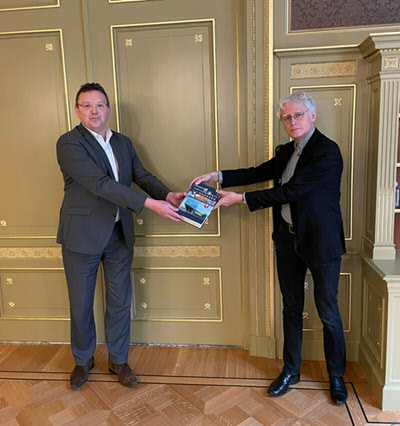Presentation of third and final part of Universiteit van het Noorden
On Monday 24 January, the President of the Board of the University of Groningen, Prof. Jouke de Vries, was presented with the first copy of the third and final part of the book series Universiteit van het Noorden [University of the North] by its author, Prof. Klaas van Berkel. This series comprises the grand overview of the history of the University of Groningen since its founding in 1614.
In this third part, subtitled by the author as De zakelijke universiteit [The business university], Van Berkel, emeritus professor of History in Groningen, reflects critically but equitably on the turbulent period from the end of the Second World War almost right up until today.
Unrecognisable change
The University of Groningen has changed unrecognisably since the end of the war. The University has grown from a small academic community into a modern business: entrepreneurial, market oriented, and internationally focused. This commercialization, which is so characteristic of the modern history of the University, already emerged in the 1940s and ‘50s.
Commercialization
The establishment of the Faculty of Economic Sciences (now: the Faculty of Economics and Business) in 1948 was a clear manifestation of the commercialization and the strong increase in the number of students that, after 1955, necessitated the government and universities to organize and govern the university differently. Under the surface of the segregated nation, shifts of seismic proportions shook the land in these years as well as the University of Groningen, triggering a slow but unavoidable transition into the modern world.
Democratization
The radical democratization that students, staff, and a few professors in the 1960s and ‘70s managed to bring about, which reached further than at any other university, appeared to call a halt to the commercialization. Yet, from the mid-‘70s, an approach focusing on operationalization, efficiency, and cost management once again caught the wind in its sails.
Academic character
Digitization, the arrival of thousands of international students, the physical expansion of the University, the scaling-up in research, and the shortening and tightening of degree programmes have made it so that the University of today hardly resembles the University that tried to recover from the war. The question proposed by the author, therefore, is: Has the University of Groningen indeed managed to retain its academic character, despite all these changes?
The book has been available to purchase from shops and from the publisher since 25 January. The official book launch will take place on 22 June. This event will also mark the end of the overarching project on ‘Writing UG history’.

More news
-
15 September 2025
Successful visit to the UG by Rector of Institut Teknologi Bandung
